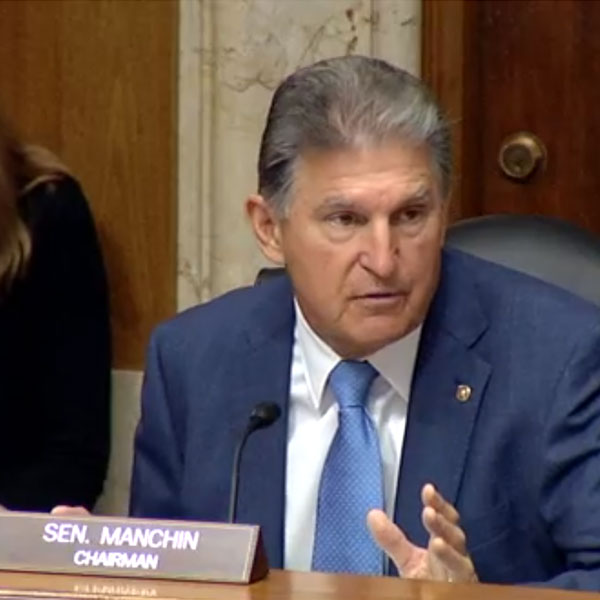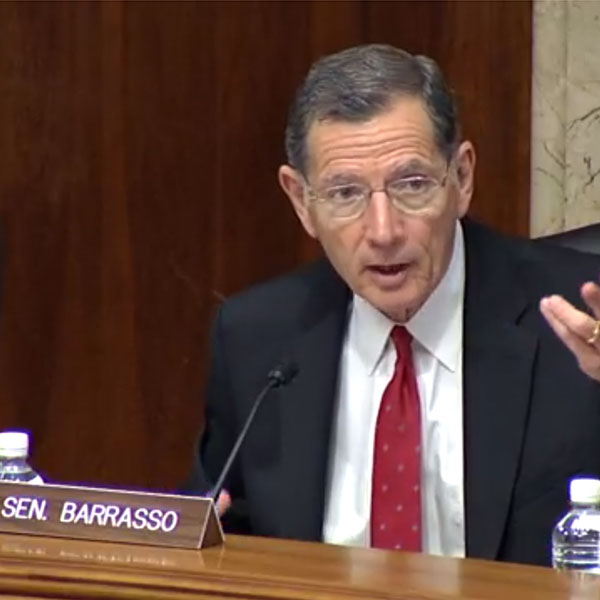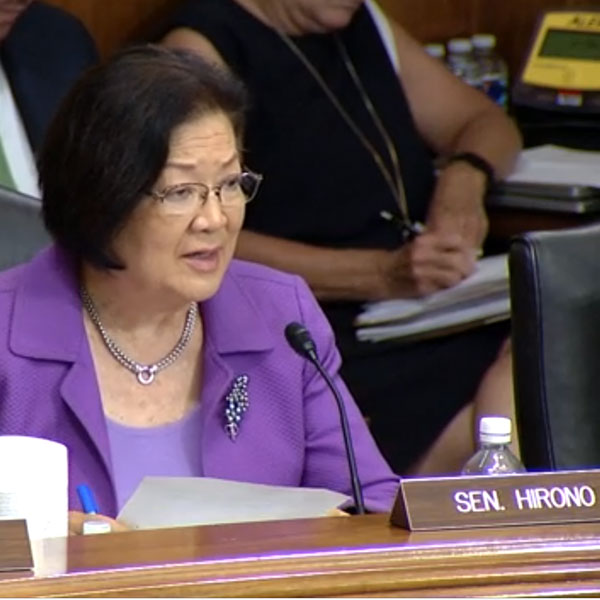
Sen Joe Manchin’s (D-W.Va.) effort to draft a modest energy infrastructure bill that can gain bipartisan support took a major step forward Wednesday, adding 48 amendments and winning a 13-7 vote before the Senate Energy and Natural Resources Committee.
Sens. Bill Cassidy (R-La.), Steve Daines (R-Mont.) and Lisa Murkowski (R-Alaska) voted with the committee’s 10 Democrats to move the bill forward.
The Energy Infrastructure Act, which committee Chair Manchin introduced last month, originally proposed $95 billion for a broad range of grid infrastructure, resilience and cybersecurity projects, clean energy supply chain development and low- and no-carbon technologies, as well as Western water infrastructure and wildfire prevention measures. An initial hearing on June 24 was largely overshadowed by President Biden’s announcement of the bipartisan agreement of a framework for a $1.2 trillion infrastructure package. (See Biden, Manchin Push Bipartisan Infrastructure Plans.)
Now with $98 billion worth of programs, the 495-page bill before the committee incorporated “suggestions made during and since our [June] legislative hearing,” Manchin said.
Many of the amendments were raised, and mostly voted down, on party-line votes. But closing the hearing, Manchin thanked both sides of the aisle for their efforts and not putting “roadblocks up that we couldn’t pass over.”
Even as the bipartisan working group, which includes Manchin, continues to hash out a larger $1.2 infrastructure package, “we’re the first committee that has absolutely a working document,” he said. “And to do a markup on this was something pretty spectacular in this quick, quick timeframe.”
In his opening statement, Manchin said, “This package not only includes provisions that have enjoyed strong bipartisan support in this committee, and bills like the SCALE [Storing CO2 and Lowering Emissions] Act for carbon capture infrastructure … which had been championed by my colleagues around the room, but also delivers on President Biden’s American Jobs Plan in many big ways and has earned the support of a wide swath of stakeholders.”

While acknowledging the bipartisan efforts, Sen. John Barrasso (R-Wyoming), the committee’s ranking member, voiced opposition throughout the hearing and was one of the no votes on the package. “The bill includes $95 billion [sic] in new spending authorizations. We’re told that prior to floor consideration. Majority Leader [Chuck] Schumer is going to turn these authorizations into mandatory appropriations, so it’s still unclear now how the majority is going to pay for this new spending.”
Going into the hearing, 37 amendments ― out of the 181 filed by Democrats and Republicans ― had already been agreed on and incorporated into the bill. More contentious and politically loaded issues were debated and received voice votes, with the majority failing on straight party lines.
Evoking recent heat waves that had melted power lines in his home state of Oregon, Sen. Ron Wyden (D) made an impassioned argument for an amendment allowing utilities repairing wires damaged in extreme heat to “work with all government bodies, but particularly both the Department of Energy and state governments.”
Manchin added his support, noting that the amendment would prevent “double-dipping” so that no project could receive funds from two different grant programs. Barrasso, however, opposed it, raising concerns that “this is going to result in California utilities drawing too much money from this underlying program.” The amendment failed on a 10-10 party line vote.
DOE as ‘Anchor’ Offtaker
Democrats were able to push back attempts by GOP senators to strike two key provisions aimed at accelerating the construction of new transmission projects.
Sen. Roger Marshall (R-Kan.) proposed an amendment to strike a section of the bill that would, he said, provide “federal backstop authority for interstate transmission lines” The section would allow the DOE to designate “national interest corridors” for transmission in areas experiencing or expected to experience transmission constraints. It would also give FERC the authority to approve projects in these corridors if a state failed to do so within a year of an application being submitted. Marshall said it would allow the federal government to “even override legitimate concerns expressed at the state level.”
Defending the provision, Manchin pointed to the urgent need to expand the transmission grid and the obstacles that now exist to project development. “We’ve had the current system in place for 15 years, and we know it’s not working,” he said. The provision “makes incremental progress in addressing some of the challenges facing development of transmission, specifically in the national interest corridors.”
Marshall’s amendment failed, again on a party line vote.
Sen. James Lankford (R-Okla.) proposed striking a second section of the bill which would give DOE the ability to help finance new transmission projects or upgrades to existing projects by becoming an “anchor” offtaker through a “capacity contract,” as well as by providing DOE loans. A contract could be terminated “as soon as practicable after determining that sufficient transmission capacity of the eligible project has been secured by other entities to ensure the long-term financial viability of the eligible project.”
The section also creates a Transmission Facilitation Fund, authorized at $10 million a year for 2022 to 2026. To qualify for such funding, a project would have to have a capacity of 1,000 MW or more for new transmission or 500 MW for line upgrades or expansions, and the DOE could contract for up to 50% of a line’s capacity.
Beyond representing a “dramatic shift” from the role of RTOs and ISOs in regional grid planning, Lankford said, the provision could inject partisan politics into project selection and development. A new Democratic or Republican administration could change which projects it favors, “and it’s going to bounce capital around,” Lankford said. “It’s a tremendous amount of capital to actually put into doing one of these projects, if suddenly you’ve got to wait until your party is in power to actually go get the next project.”
Murkowski crossed party lines to help Democrats defeat the amendment, saying it could provide help for remote communities in her state to develop microgrids. “We think it has the potential to provide some assistance in this area,” Murkowski said. “I’m exploring working with the committee here to help facilitate this. … So, I am at this point not prepared to support the motion to strike.”
Successful Amendments
Marshall was more successful, winning limited bipartisan support for two amendments, one requiring the DOE to undertake a “cradle to grave” analysis of the environmental impacts of electric vehicles and another mandating a study on “the impact of forced labor in China on the electrical vehicle supply chain.”
Daines won approval of an amendment requiring DOE to “conduct a study on the number of jobs that were lost and the effect on energy prices due to President Biden’s cancellation of the permit for the Keystone XL pipeline.”
Barrasso won support for an amendment requiring the secretary of energy to certify that no conflicts of interest are involved in granting of DOE loans. Invoking the 2011 loan default of solar startup Solyndra, Barrasso said, “Keeping political considerations out of the loan granting process is essential to restoring the integrity of these programs.”

Murkowski crossed the aisle again to support an amendment by Sen. Mazie Hirono (D-Hawaii) requiring the DOE secretary “to establish a 21st century workforce advisory board to advise the secretary on the role of the department in the development of a skilled energy workforce.” The board would have 10-15 members selected by the secretary for their expertise in workforce development and both traditional and emerging energy technologies, she said.
A number of amendments were raised, but not voted on, signaling that further work and negotiations will continue as the bill moves to the Senate floor. One example was an amendment from Hirono that would give the federal government the ability to sign long-term power purchase agreements for renewable energy. “Right now, only the Department of Defense can sign power purchase agreements for 30 years, while the rest of the federal government is limited to 10 years,” Hirono said. “A 10-year contract would not be long enough for a project developer to secure financing to build basically any kind of power project.”
Everything Paid For
Energy trade and advocacy groups were quick to praise the bill and urge passage.
Paula Glover, president of the Alliance to Save Energy, called the bill “a concrete step by both parties to assemble an infrastructure package that values energy efficiency as one of the top solutions for an energy system that is more productive, decarbonized, and equitable.” The efficiency provisions touch “all sectors in our economy — from industry and manufacturing, to homes, buildings, and schools.”
Pointing to the bill’s funding for carbon- and direct-air capture technologies, Brad Crabtree, director of the Carbon Capture Coalition, said, “The Energy Infrastructure Act takes us an important step closer to securing the full suite of carbon management tools needed for our industrial, energy and manufacturing sectors to remain on track to reach net-zero emissions by midcentury. … [It] would also establish regional hydrogen and direct air capture hubs to facilitate widespread deployment of these critical technologies.”
A statement from Lisa Jacobson, president of the Business Council for a Sustainable Economy, focused on the bill’s “technology-inclusive approach. … Clean energy and energy efficiency drive a competitive economy, and the measures under consideration would create jobs and support American industry and prosperity.”
More Compromises Needed?
The question for Manchin is what further compromises may be required to gain the 10 Republican votes he will need to pass the bill in the full Senate, and what role it will play in the larger efforts to pass the bipartisan infrastructure deal that has yet to be completely translated into legislative language.
Speaking in support of the bill prior to the vote, Sen. Mark Kelly (D-Ariz.), called it “an investment in our nation’s energy and also Western water infrastructure; an independent, indispensable piece of the larger bipartisan infrastructure package.”
In a video posted to The Hill website on Tuesday, Manchin said both the infrastructure deal and reconciliation should be fully paid for. “I think everything should be paid for. We’ve put enough free money out,” he said.




